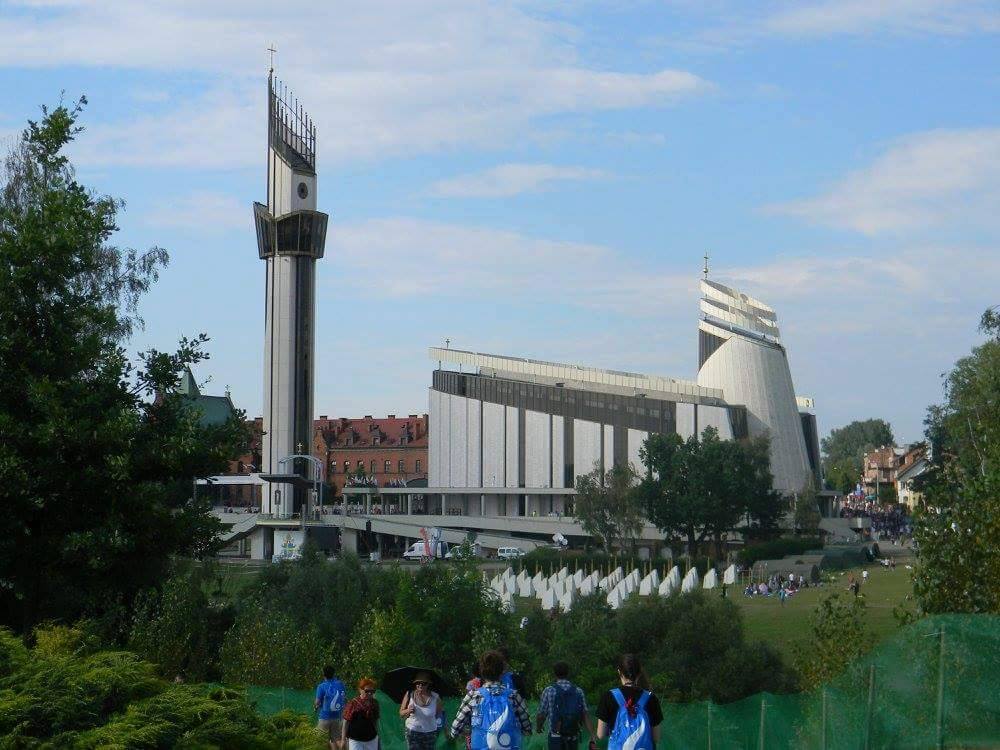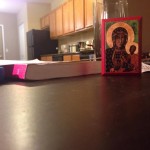
After wrapping up our prayer, hugging each other (because that is what we do as Americans), and getting some group photos in front of the shrine, we realized it was time to be getting back to the tram. To this day I am uncertain of who it was, but someone started singing “Jezu ufam Tobie” once more, possibly even subconsciously as that’s how our spontaneous singing throughout the week often started. Slowly and gradually, we all joined in and in all four parts. We sang the antiphon in a sort of Taizé manner as we made our way across the grounds back to the tram station. At one point we walked underneath a covered walkway with a curved roof and we were suddenly taken aback at the magic of the acoustics as we heard all of our voices in harmony.
Other pilgrims, locals, police securing the area for the Papal visit, all stopped whatever they were doing to hear us. Some people even literally parted the crowd on the sidewalk to stop and listen and let us pass. It was a weird feeling. It could’ve been a near occasion of pride, but I think we were in fact humbled that we could partake in a small taste of the beauty of Christ’s Mercy through our gift of music. I could tell in the faces of the people we passed that they recognized the simplicity, organic nature, and the prayerfulness of our song. As we made it to where we would cross the street to the tram station, those in front held up the sign for the coda and we all ended together.
As soon as we were done, the group next to us first complimented us on our voices, and one even recognized us from the Mercy Centre masses, so then we had the chance to converse with them. In the sharing of our gifts, we were given the opportunity for the sharing of ourselves, and were able to show others (even strangers) an interest in who they were, where they came from, and what their experience of WYD was. In retrospect, I think if everything was open we would have all gone in and prayed and done our own thing, but we were given the opportunities for fellowship, prayer, and sharing our gifts with others that we would not have experienced if we all got to do exactly what we had envisioned for the day.
For me, the message of Divine Mercy that St. Faustina helped to bring into a hurting world is threefold. Firstly, it’s a reminder of course that yes, I am indeed a sinner who doesn’t even know how to pray well. But it’s okay, it’s more than okay, because Christ’s Divine Mercy flowing out from his side “on us and on the whole world” will cover our imperfections if we dare to turn to him. All that is “wrong” is not in fact wrong if we trust in Jesus, even our darkest sins. In the words of the Latin prayer the Anima Christi: “Blood of Christ, inebriate me. Water from the side of Christ, wash me”.With those words in mind, I imagine the Divine Mercy as Christ’s blood brings peace and joy, and the water cleanses us with absolution.
Second, there is the element of trust, which must coexist with humility. Jezu ufam Tobie, like the “thy will be done” of the Lord’s Prayer or Christ’s prayers in the garden of Gethsemane, are words that require a submission of one’s own will. Letting go of one’s own plans or one’s own imperfect prayers and making room for trust and for God’s will brings greater plans than one could ever imagine, even when it still seems like everything is going “wrong” in earthly terms.
Third, I think a case can be made that Divine Mercy allows hope for sinning humans to become like Him, or what might be referred to in fancy Eastern terms as theosis. In the Latin liturgy, as the priest pours water into the wine, he says the words: “by the mystery of this water and wine may we come to share in the divinity of Christ”. The water and wine simultaneously symbolize the water and blood of Christ’s side, and the humanity and divinity of Christ. Just as the water can no longer be separated from the wine once added, the divinity of Christ can no longer be separated from humanity after the Incarnation. In the words of St. Athanasius of Alexandria: “He was incarnate that we might be made God”.
In the weeks following WYD I must admit that it has not gotten any easier to let go of my own plans or to trust in Jesus’ Divine Mercy. In fact, it’s gotten harder and harder. Whenever I feel scared, uncertain, overwhelmed, anxious, or unhealthily guilty I have started to try to remember to look down at my wrist and read the words on my bracelet: Jezu ufam Tobie. I try to quietly sing the Bębenek tune to myself. But I fail. I don’t remember, I can’t fully trust, or I sin again and again and again. But it’s still okay. It’s more than okay, because the blood and water of Christ’s Divine Mercy still flows over me and on the whole world.












